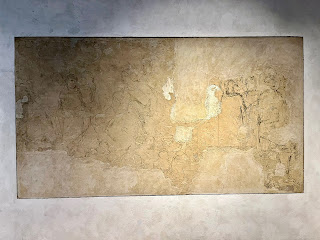Cocteau and his missed bit of information
I recently read in Cocteau's The difficulty of Being (La difficulte d'etre) that he most admired two heroines: Antigone and Joan of Arc. I can only sympathize, but Cocteau does not expand on this, so one is left wondering why such an interesting choice. These are two extraordinary embodiments of the Normative. Antigone and Joan of Arc are, in different contexts, but to the same degree, the implementation of the ultimate pereat mundus. It is as if Cocteau were saying that he was fascinated by the goddess of Duty. And yet... , and yet...
When Cocteau revisited Greek mythology with his surrealist taste, he opted for Orpheus (The Orphic Trilogy is a collection of three films in Jean Cocteau's œuvre: Blood of a Poet, Orphee, and Testament of Orpheus). Orpheus (Orphee, 1949) looses Eurydice because he cannot resist the temptation of getting that extra bit of information. He has to look back. It seems that he admired Duty, but felt more at home with Curiosity, by which he was more deeply attracted.
How often have we felt screaming at him... After all he had done... Idiot... Damn idiot... You were almost out. You had tricked Death. Why trying to get now what you could have enjoyed for the rest of your life? Why could you not wait just a little longer? Orpheus needs to see Eurydice then (their indexical nunc) because only then he and she are there (Orpheus' indexical hinc), on the very threshold between life and death; she is his and yet still among the dead, while he is not. The opportunity is unique, the potential experience too tempting, the risk appears negligible. It is a bit of information nobody else could provide, that could be obtained at no other time, in no other place. Then or never. Time (look now) vs. space (look there, look back): surely time is stronger and must prevail?
Orpheus miscalculates, bad player in a strange prisoner's dilemma a trois. For that bit of information he is ready to risk and indeed loose all, so unreasonably, so selfishly.
Antigone and Joan of Arc would have abided. They would have won the game with Death, this round. But Orpheus and Cocteau cannot play by the rule. They cannot do what must be done to the very last step. Orpheus has been warned and yet he looks. Like Adam, who bytes, Cocteau's Orpheus glances at Eurydice in the rear-view mirror of a car and Death claims her back. The price is the ultimate loss of that which one already had but did not know to have. Some information can be very expensive indeed.
I closed the book with the impression that Cocteau admired his heroines of Duty, but that he also betrayed them with his life and work; not unlike Orpheus, who betrays Eurydice's trust, despite his great love for her, Cocteau wanted to see.






Couldn't it be that Cocteau admired all the three, Orpheus, Antigone and Joan of Arc, because they all followed their will without caring about the consequences? And that the focus is much more on courage of one's own ideas and will, than on duty and curiosity?
ReplyDeleteAfter all, as long as duty is concerned, there's a big difference between a just duty and an unjust one. Therefore, one cannot always equal undutifulness and betrayal. Antigone's was an unjust duty. Orpheus had to respect at least as much Hades's will as Eurydice's. And Joan of Arc's was a duty which was not codified. She saw it as God's will, but not many others agreed. It was probably more her personal will than a duty.
After all, it would be perhaps more suitable to an atheist like Cocteau to see the importance of following one's own desires than that of following one's own duty.